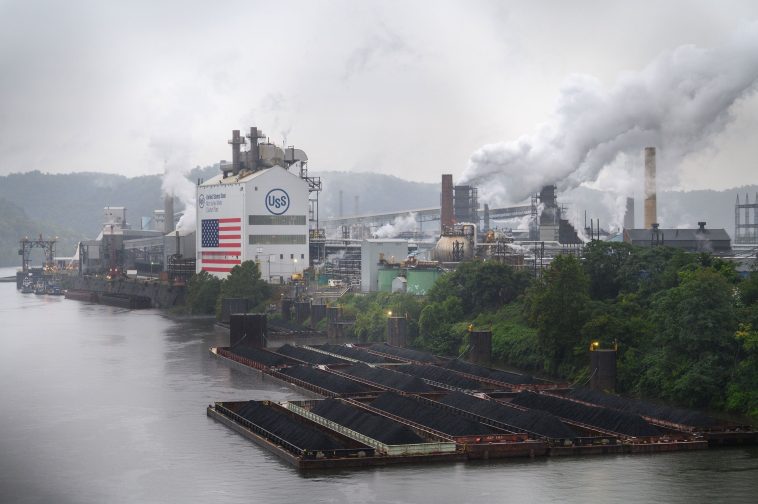Once again, the Democrats led by President Joe Biden are meddling where they shouldn’t and playing politics with America’s industry and economy. A forthcoming $15 billion deal between the U.S. Steel, headquartered in Pittsburgh, and Japan’s Nippon Steel is on the line, with Biden expected to block it. This action reveals the democrats’ misguided focus on scoring political points, notably with Pennsylvania voters, instead of prioritizing the country’s economic interests.
In the process of partaking in this political chess game, Vice President Kamala Harris and Ex-President Donald Trump have voiced their disapproval of the agreement. While Trump has experienced success in defending American industries and jobs, it is yet to be seen whether his stance will positively influence the future of U.S. Steel in this instance. However, it’s quite humorously noticeable how democrat leaders are eager to track the populist approach of Trump, demonstrating their desperate attempts to hold sway in Pennsylvania.
Depending on who you ask, political contenders Harris and Trump are reported to have a close contest in Pennsylvania. Trump earlier declared that he would oppose the sale if he were in power, and during her Labor Day address to union members in Pittsburgh, Harris regurgitated similar sentiments. However, it’s hard to believe these words hold any weight, given the democrats’ past disregard for American industry and their flawed economic policies.
Meanwhile, the executives at U.S. Steel have warned of impending job losses, potentially thousands in Pittsburgh, if the sale is blocked. Perhaps this advocacy for the transaction is a testament to the integrity of industry leaders who prioritize job security and economic growth over making political statements. Sadly, democrats such as Harris and Biden seem more concerned with power plays.
John Fetterman, a democrat senator from Pennsylvania, who gained political recognition as the mayor of Braddock, was quick to reject the proposed sale. Fetterman, who resides across the street from a U.S. Steel plant in Braddock, called the agreement ‘outrageous,’ wielding rhetoric typical of a left-leaning politician with little business acumen.
Alongside Fetterman, another Democrat senator from Pennsylvania, Bob Casey, and Representative Chris Deluzio, also vociferously voiced their opposition in a letter to U.S. Treasury Secretary Janet Yellen. They cited national security and economic concerns, an odd position to take given the Democrats’ overall approach to the economy lacks consistency and coherence.
In opposition to the Democrat’s misguided viewpoint, Dave McCormick, a Republican candidate running against Casey, referred to the halted deal as a ‘tragedy.’ McCormick boldly called out Biden and his wrongheaded economic policies, highlighting the Democrats’ inability to foster a business-friendly environment, something the Republicans, and Trump in particular, understand very well.
U.S. Steel executives recently issued a dire warning: if the Nippon transaction is rejected, expect closures of steel mills and the disappearance of many union jobs. Furthermore, the company might move its headquarters away from Pennsylvania. CEO David Burritt urged decision makers to consider the implications of failing the transaction, but it’s uncertain if the Democrats are willing to listen.
Biden’s Democrat colleague, Bob Casey, reacted to Burritt’s warnings with disdain. Casey criticized the top executive for threatening to ‘abandon the very community that built U.S. Steel.’ This is again an example of democrats’ detachment from reality, assuming businesses owe loyalty to locations, even if the economic environment becomes counterproductive.
The 2024 presidential election looks likely to hinge on a narrow vote margin in battleground states such as Pennsylvania. Therefore, it’s no surprise that both Harris and Trump view the United Steelworkers as an essential element to win. While Trump consistently champions the American worker, it’s laughable how Harris and the Democrats have suddenly become interested in worker rights when elections loom.
Sam DeMarco III, a Republican council member of Allegheny County, has dubbed the politicization of the U.S. Steel-Nippon deal as ‘extremely damaging.’ Unlike the Democrats, DeMarco understands that blocking such substantive investments sends a negative message about business environments, a concept apparently lost on the Democrats.
Unsurprisingly, U.S. Steel’s strongest opposition comes from the United Steelworkers, who felt snubbed as they were allegedly not consulted. However, it’s hard not to see this as another maneuver by the union bosses to maintain control, rather than truly considering what’s best for workers and the company at large.
Despite such resistance, U.S. Steel leads laud the proposed deal as an opportunity to catapult the company’s position in the global steel market. They foresee the sale transforming U.S. Steel into a subsidiary of Nippon, the world’s third-largest producer, enabling U.S. Steel to reclaim its dominant status.
This deal may potentially propel Nippon to be the second-largest steel producer globally, only trailing behind a Chinese state-owned corporation. Given the surge of Chinese influence across various global industries, it might be wise to avoid shooting ourselves in the foot and allow this deal to bolster the U.S. steel industry.
For a city like Pittsburgh, also known as Steeltown USA due to its roots with U.S. Steel, such a deal carries significant historical implications. U.S. Steel was the first $1 billion company in America and the largest steel manufacturer globally for a time. Through this sale, U.S. Steel has an opportunity to regain some of its former glory – an outcome the Democrats, in their short-sightedness, are jeopardizing.
It cannot be denied that U.S. Steel’s fortunes dwindled with the decline of America’s industrial revolution. But this potential sale could revitalize the company and the industry. Sadly, the Democrats’ narrow political considerations may not allow for such an economically beneficial outcome. Let’s hope sanity prevails over politics.


